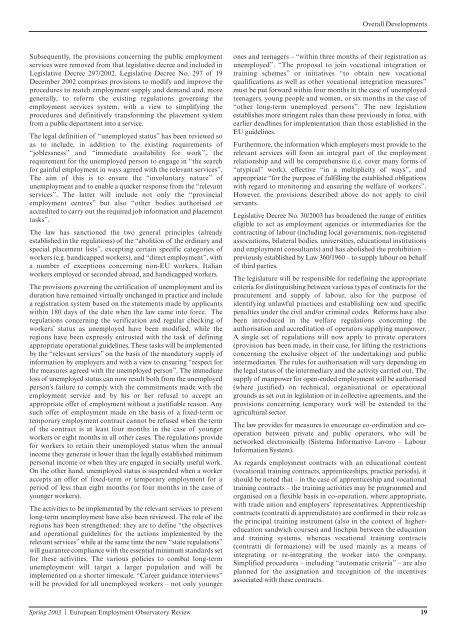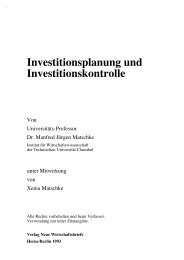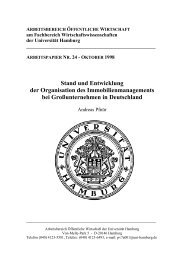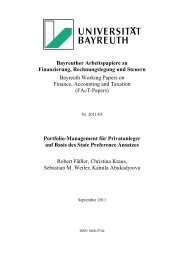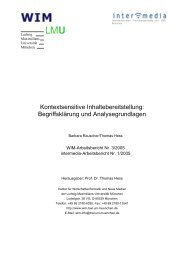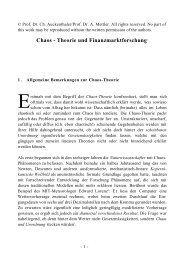FRANCE The
FRANCE The
FRANCE The
You also want an ePaper? Increase the reach of your titles
YUMPU automatically turns print PDFs into web optimized ePapers that Google loves.
Subsequently, the provisions concerning the public employment<br />
services were removed from that legislative decree and included in<br />
Legislative Decree 297/2002. Legislative Decree No. 297 of 19<br />
December 2002 comprises provisions to modify and improve the<br />
procedures to match employment supply and demand and, more<br />
generally, to reform the existing regulations governing the<br />
employment services system, with a view to simplifying the<br />
procedures and definitively transforming the placement system<br />
from a public department into a service.<br />
<strong>The</strong> legal definition of “unemployed status” has been reviewed so<br />
as to include, in addition to the existing requirements of<br />
“joblessness” and “immediate availability for work”, the<br />
requirement for the unemployed person to engage in “the search<br />
for gainful employment in ways agreed with the relevant services”.<br />
<strong>The</strong> aim of this is to ensure the “involuntary nature” of<br />
unemployment and to enable a quicker response from the “relevant<br />
services”. <strong>The</strong> latter will include not only the “provincial<br />
employment centres” but also “other bodies authorised or<br />
accredited to carry out the required job information and placement<br />
tasks”.<br />
<strong>The</strong> law has sanctioned the two general principles (already<br />
established in the regulations) of the “abolition of the ordinary and<br />
special placement lists”, excepting certain specific categories of<br />
workers (e.g. handicapped workers), and “direct employment”, with<br />
a number of exceptions concerning non-EU workers, Italian<br />
workers employed or seconded abroad, and handicapped workers.<br />
<strong>The</strong> provisions governing the certification of unemployment and its<br />
duration have remained virtually unchanged in practice and include<br />
a registration system based on the statements made by applicants<br />
within 180 days of the date when the law came into force. <strong>The</strong><br />
regulations concerning the verification and regular checking of<br />
workers’ status as unemployed have been modified, while the<br />
regions have been expressly entrusted with the task of defining<br />
appropriate operational guidelines. <strong>The</strong>se tasks will be implemented<br />
by the “relevant services” on the basis of the mandatory supply of<br />
information by employers and with a view to ensuring “respect for<br />
the measures agreed with the unemployed person”. <strong>The</strong> immediate<br />
loss of unemployed status can now result both from the unemployed<br />
person’s failure to comply with the commitments made with the<br />
employment service and by his or her refusal to accept an<br />
appropriate offer of employment without a justifiable reason. Any<br />
such offer of employment made on the basis of a fixed-term or<br />
temporary employment contract cannot be refused when the term<br />
of the contract is at least four months in the case of younger<br />
workers or eight months in all other cases. <strong>The</strong> regulations provide<br />
for workers to retain their unemployed status when the annual<br />
income they generate is lower than the legally established minimum<br />
personal income or when they are engaged in socially useful work.<br />
On the other hand, unemployed status is suspended when a worker<br />
accepts an offer of fixed-term or temporary employment for a<br />
period of less than eight months (or four months in the case of<br />
younger workers).<br />
<strong>The</strong> activities to be implemented by the relevant services to prevent<br />
long-term unemployment have also been reviewed. <strong>The</strong> role of the<br />
regions has been strengthened: they are to define “the objectives<br />
and operational guidelines for the actions implemented by the<br />
relevant services” while at the same time the new “state regulations”<br />
will guarantee compliance with the essential minimum standards set<br />
for these activities. <strong>The</strong> various policies to combat long-term<br />
unemployment will target a larger population and will be<br />
implemented on a shorter timescale. “Career guidance interviews”<br />
will be provided for all unemployed workers – not only younger<br />
Overall Developments<br />
ones and teenagers – “within three months of their registration as<br />
unemployed”. “<strong>The</strong> proposal to join vocational integration or<br />
training schemes” or initiatives “to obtain new vocational<br />
qualifications as well as other vocational integration measures”<br />
must be put forward within four months in the case of unemployed<br />
teenagers, young people and women, or six months in the case of<br />
“other long-term unemployed persons”. <strong>The</strong> new legislation<br />
establishes more stringent rules than those previously in force, with<br />
earlier deadlines for implementation than those established in the<br />
EU guidelines.<br />
Furthermore, the information which employers must provide to the<br />
relevant services will form an integral part of the employment<br />
relationship and will be comprehensive (i.e. cover many forms of<br />
“atypical” work), effective “in a multiplicity of ways”, and<br />
appropriate “for the purpose of fulfilling the established obligations<br />
with regard to monitoring and ensuring the welfare of workers”.<br />
However, the provisions described above do not apply to civil<br />
servants.<br />
Legislative Decree No. 30/2003 has broadened the range of entities<br />
eligible to act as employment agencies or intermediaries for the<br />
contracting of labour (including local governments, non-registered<br />
associations, bilateral bodies, universities, educational institutions<br />
and employment consultants) and has abolished the prohibition –<br />
previously established by Law 360/1960 – to supply labour on behalf<br />
of third parties.<br />
<strong>The</strong> legislature will be responsible for redefining the appropriate<br />
criteria for distinguishing between various types of contracts for the<br />
procurement and supply of labour, also for the purpose of<br />
identifying unlawful practices and establishing new and specific<br />
penalties under the civil and/or criminal codes. Reforms have also<br />
been introduced in the welfare regulations concerning the<br />
authorisation and accreditation of operators supplying manpower.<br />
A single set of regulations will now apply to private operators<br />
(provision has been made, in their case, for lifting the restrictions<br />
concerning the exclusive object of the undertaking) and public<br />
intermediaries. <strong>The</strong> rules for authorisation will vary depending on<br />
the legal status of the intermediary and the activity carried out. <strong>The</strong><br />
supply of manpower for open-ended employment will be authorised<br />
(where justified) on technical, organisational or operational<br />
grounds as set out in legislation or in collective agreements, and the<br />
provisions concerning temporary work will be extended to the<br />
agricultural sector.<br />
<strong>The</strong> law provides for measures to encourage co-ordination and cooperation<br />
between private and public operators, who will be<br />
networked electronically (Sistema Informativo Lavoro – Labour<br />
Information System).<br />
As regards employment contracts with an educational content<br />
(vocational training contracts, apprenticeships, practice periods), it<br />
should be noted that – in the case of apprenticeship and vocational<br />
training contracts – the training activities may be programmed and<br />
organised on a flexible basis in co-operation, where appropriate,<br />
with trade union and employers’ representatives. Apprenticeship<br />
contracts (contratti di apprendistato) are confirmed in their role as<br />
the principal training instrument (also in the context of highereducation<br />
sandwich courses) and linchpin between the education<br />
and training systems, whereas vocational training contracts<br />
(contratti di formazione) will be used mainly as a means of<br />
integrating or re-integrating the worker into the company.<br />
Simplified procedures – including “automatic criteria” – are also<br />
planned for the assignation and recognition of the incentives<br />
associated with these contracts.<br />
Spring 2003 | European Employment Observatory Review 19


